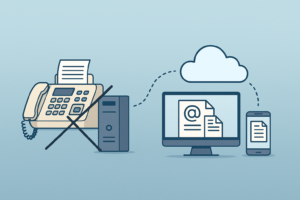Although Alexander Graham Bell's invention has served this country dutifully for over a century, it looks like the traditional phone line is going the way of the dinosaur. This technology may have been revolutionary in its day, but years of innovation have allowed for modes of communication that are far superior. People just don't utilize phone lines like they used to, and it's beginning to show.
According to USTelecom, phone lines in America peaked in 2000, when the trade group estimated there to be 186 million lines in the country. Since that time, more than 100 million copper lines have been found to be no longer operational. While this is big news for those who refuse to upgrade in favor of working with systems they know, this revelation is most relevant to businesses that rely on faxing for their daily operations.
"46.7 percent of Americans don't have a landline."
American telecom and its customers moving away from phone lines
When it comes to the impending death of America's copper line infrastructure, finding a single entity to blame is easier said than done. The root of the problem seems to be that Americans simply don't want to use landlines anymore. With the Pew Research Center having found that 92 percent of U.S. adults own a mobile phone of some kind, it's clear that people are changing up how they communicate with their peers. In fact, a 2015 study conducted by the Centers for Disease Control and Prevention found that 46.7 percent of Americans don't have a landline in their home.
While the world seems to be shifting to a more wireless space, the CDC numbers still show that a majority of Americans want to use the existing phone-line infrastructure. Therefore, at least some of the blame needs to be shifted toward the American telecom companies themselves. Organizations all over the country seem to be doing their best to distance themselves from copper lines. AT&T raised some eyebrows in 2014 when it began work to amend the Illinois Telecommunications Act. The Chicago Tribune reported that the telecom giant was working to take out the "obligation to serve" clause.
This section requires companies like AT&T to provide the option of landline services to all Illinois residents. While that seems like a harsh regulation, it was necessary in a time when America was working to connect the entirety of the country without neglecting any areas. That being said, it would appear that the American public no longer views phone lines as the best avenue of connection. The Internet and smartphones are allowing them to do this with much more ease, and as such copper lines are being thrown aside.
AT&T isn't the only telecom that seems to be moving away from phone lines, either. After Hurricane Sandy ravaged much of the East Coast, Verizon decided that it would not be reconnecting downed copper lines. Although the company is working to replace many of these lines with wireless alternatives – a service called Voice Link is allowing people to keep their old phones – it would appear the death of the American phone line is on the horizon.
Legacy fax systems won't work soon
While much of the general public may be fine with losing their landlines, there's more at stake here than simple phone conversations. Due to their utilization of copper lines to transmit information, legacy fax machines are also being affected by the loss of phone lines. This has huge repercussions for much of the business world, as many organizations still rely on faxing as a means for transporting sensitive documents.
Faxing has long been favored as one of the most secure modes of communication, especially above email. Email has too many vulnerabilities to be a solid avenue for private information, and as such many industries simply opt to rely on faxing to get their documents where they need to go. What's more, many regulatory compliance standards don't even allow companies to use email.
The Health Insurance Portability and Accountability Act, for example, has incredibly strict rules governing the movement of sensitive patient information. Those who violate these standards face steep fines, regardless of the intent. An employee can break one of these rules accidentally and still face a maximum of $1.5 million in fines. With so much money on the line – not to mention the value of the company's image – it's easy to see why many organizations have stuck with legacy faxing for so long.

FoIP can help
With America's copper phone-line infrastructure quickly slipping away, the question remains as to what companies relying on legacy fax should do in order to keep their communications safe. Thankfully, a viable solution exists that is both convenient and incredibly secure. Fax over IP is a wonderful innovation. This corporate communication tool combines the reliability of legacy fax with the incredible speed of the Internet.
FoIP is also incredibly capable of meeting a wide variety of compliance standards. Although many other Internet-based means of communication aren't allowed in guidelines such as HIPAA, FoIP has always been a safe option for organizations to send documents back and forth. The best part of all of this is the fact that FoIP doesn't rely on copper phone lines to get the job done. Companies that require faxing for one reason or another need not worry about the degradation of America's phone line infrastructure, as FoIP has them covered.
Enhance enterprise communication, collaboration and compliance efforts with a proven FoIP solution from FaxCore. Contact FaxCore today to learn more about their 'Partly-Cloudy' fax solutions.




